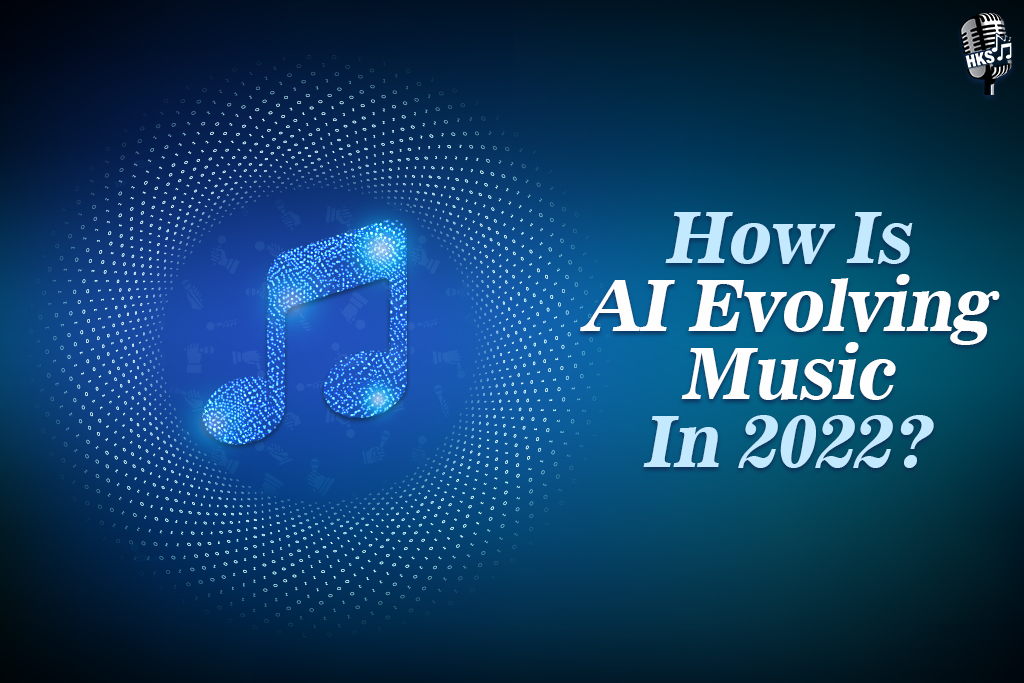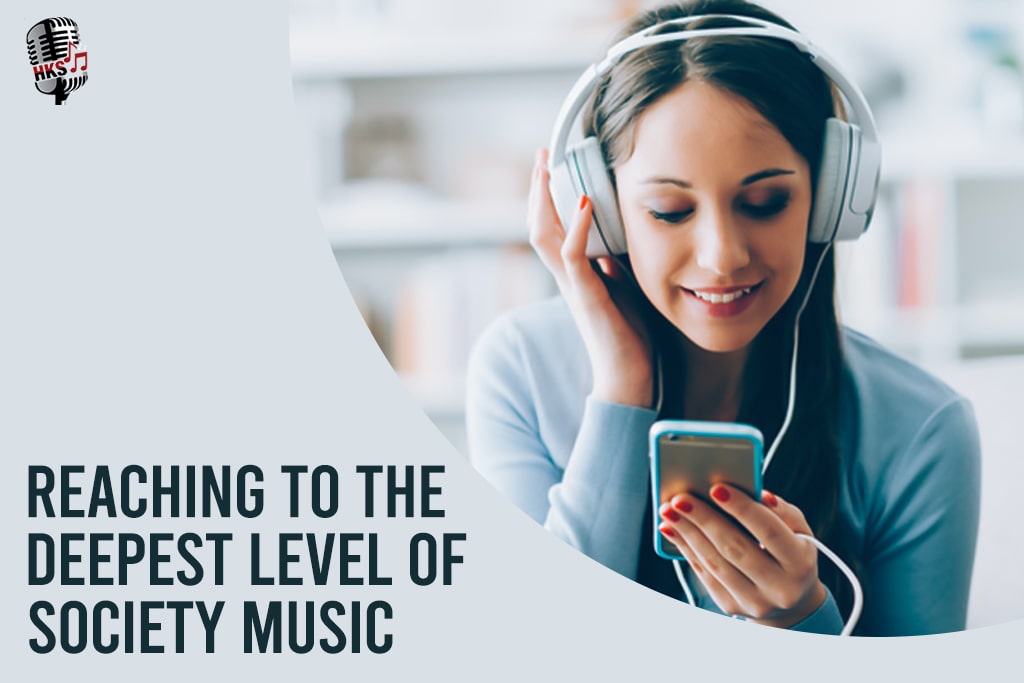Republic Day Sale | 35% Off | USE COUPON CODE - HKSREPUBLIC35

You are listening to your favorite pop music and wondering who that new fantastic collaborator is? Surprisingly, it might not be a who but, moreover, a what. Yes, that new hotshot collaborator could be artificial intelligence or AI. But, as AI is rapidly influencing all other realms of the world, it is only time before the ripple effects strike the music industry. In this blog, we will delve deeper into the phenomenon of how AI is evolving music in 2022.
What is AI?
The emergence of artificial intelligence is nothing less than a paradox. At one glance, everybody appreciates how helpful it is, while on the other hand, people feel pretty intimidated by its prying eyes. Hence, artificial intelligence has left everybody with mixed feelings.
Simply put, artificial intelligence is work done by machines with human brains like simulation. This computer-based system can think, process, and generate actions that a human brain can, for example, natural language processing, speech recognition, and machine vision. The machine can comprehend data given to it based on the input it has been fed, then decide to act upon executing the operation. The machine can think and conjure a decision to act upon, which we humans can do instantly. We don't realize how complicated it is for our brain to do so, but we do, and we are very humble about it. Humble enough to build consciousness into a machine so that it can work at least 1/100th as efficiently and independently as us. It makes our work easier, saves time, effort, and human resources, and is cost-effective. Hence, it is a whole new level of advancement for human civilization. However, it doesn't cease there, a problem we will discuss further.
To build a view on that, we first have to understand the fundamental functioning of AI. The success of an AI mechanism depends entirely on the data fed to it. For example, suppose an AI is built to identify a cat. In that case, the engineers will have to feed the system with thousands and thousands of pictures of cats and random things that are not cats and manually demarcate them into two broad categories: cat and not a cat. This is called a data set. The more data set (input) it is fed with, with this distinction, the more accurate and efficient the system becomes in identifying cats. This is how a simple artificial intelligence system is built from scratch, and more actions, formulas, and coding advance it to what we see around us. Based on the simple principle of inducing the skill of human comprehension and thought processing in a computer system, there are three major branches of AI:
- Artificial General Intelligence (AGI) - can do everything involving general human prudence and apply intelligence to multiple tasks. It is also called deep AI and is the most popular and extensively explored dimension of AI.
- Artificial Narrow Intelligence (ANI) - can do a single task at hand but with extreme intelligence, for example, playing chess or crawling a web page. It is called "weak AI" because of its ability to operate only in a predetermined, pre-defined range. One of its well-understood examples could be Siri. It is narrow because it is not a conscious machine that responds to our queries. Instead, it processes our language, enters it into a search engine such as Google, and fetches the results. That is why when we ask abstract questions to Siri or Google assistant like "what does it mean to be alive?" or "is there life beyond death?" we get absurd answers. Then both the assistant's surf all the philosophical articles related to such subjects, present them on the internet and then show them to us.
- Artificial Super Intelligence (ASI) - Though this is a hypothesis, the idea is very much there in the minds of AI developers. This is that branch of AI, which has to be tread lightly upon, according to engineers, because they believe that there will be a time when AI will surpass the intelligence of the greatest human minds ever, in every domain, be it arts, general aptitude, problem resolving, everything. And it might also bring doom to humankind. Yes, that idea is the source of many science fiction movies, including Terminator, Chappie, MCU's Age of Ultron, and many other series and shows, with which your Google assistant can bombard your screen.
With that being said, we will now further see how these aspects of AI influence making music.
How is AI evolving music in 2022?
AI is helping in creating new songs.
Music Composer Davide Cope has been working on the Experiments in Musical Intelligence (EMI) project for the last 30 years. In 1982, when Cope started this project to cure his "composer's block, " little did he know that his algorithm would be instrumental in many original compositions in various genres and styles today. AIVA, an AI assistant, uses AI and deep learning to help mainstream users compose their soundtrack music and scores. Content creators extensively patronize it on YouTube, Twitch, TikTok, and Instagram as they can maintain a steady supply of music without the exhaustingly heavy budget of royalties. For example, grammy-nominated music producer Alexa da Kid used IBM Watson to create his track 'Not Easy' after analyzing hit songs and cultural data from films, social media, and online articles for five years to develop a theme for the AI-generated song. The song 'Not Easy' reached fourth on the iTunes Hot Tracks within 48 hours after its release. Music Composer trio Drew Silverstein, Sam Estes, and Michael Hobe created Amper, a user-friendly online tool that helps online content creators, non-musicians, and musicians in Composing their music free of royalty on their parameters in a few minutes. The idea of creating such a platform hit the trio when they started receiving requests for background music for television and video games while creating music for massively budgeted movies like The Dark Knight. Amper was acquired by digital tech and tools giant Shutterstock in 2020.
AI is creating virtual pop stars.
When the world came to a halt because of the Covid 19 pandemic and people were locked in their homes, with restricted movement and the precariously lingering threat of the virus infliction, people missed going outdoors, especially to music concerts.
Authentic Artist is an audiovisual platform with an extensive collection of AI-powered virtual artists who deliver new music through unique collectibles and social music experiences. The platform is one of a kind as it allows the animated virtual Artist to play an entirely original composition on the screen and respond to the audience's feedback by increasing/decreasing the tempo or intensity or even fast-forward to the next song in the queue.
AI provides influences musical preferences.
You must have heard about Spotify. Their 'Discover Weekly' playlist must have often blown you. A factor that makes Spotify successful is its algorithm, and we do not have to fret further about the fact that the algorithm is the result of AI. When you use the platform, in the very beginning, it asks about your music preferences, and after that, as you keep listening, it learns more about your biases. After that, Spotify is able to offer a series of different soundtracks for each mood, be it happy, sad, optimistic, or romantic. Moreover, users get newer and relevant content after they have finished their current playlist or album. Therefore, AI helps music streaming platforms provide a highly personalized experience to music lovers and discover, teach, and explore new genres.
AI introduces the next prominent artist on the block.
Going further in the same tangent of AI and algorithms of online streaming services, AI helps discover promising new artists. AI facilitates the music industry by discovering A&R (Artist and repertoire) by glancing through the industry and identifying the next breakout star. If you are an enthusiast of music, you must have heard about Shazam. Whether you are in a mall, cafe or bar, if you hear a song and want to know more about it, all you have to do is make Shazam listen to it. Shazam hears much better than people; then, it breaks music down to digital data, matching multiple points of a sample against a spectrogram (a graph of a song's time-frequency) to ensure an accurate match. It works with the algorithm to create a unique acoustic fingerprint for each track rather than trying to capture the whole song, thus turning a song into a piece of data. However, a lesser but more valuable offering that Shazam provides is for the music executives. It works as an early-detection system for hits. By studying 20 million searches daily, Shazam can identify which song is catching on and where months before most people have even heard of it. The company possesses a team of people who update its vast music library with the newest recorded music, inclusive of self-produced songs from across the world. Artists can also submit their creations to Shazam. The company plans to be in the music-making business, launching a new imprint under the Warner Music Group for artists discovered straight from the application.
Therefore, while some rudimental might point out how AI is disrupting employment and manual labor, strictly in the parlance of making music, we can safely say that though it can not and may not ever replace the human mind's creativity, it does broaden the horizon of making music, and we are living its evolution each day.

.jpg)






Soniya Rao
3 years ago
It's amazing to see how the music industry has developed. Excellent blog, keep it up!
Rakesh Saluja
3 years ago
I am fascinated by AI music, and I enjoy reading more about it every day. You covered some very interesting points on your blog. Well done!
Ravi Chaurasiya
3 years ago
It's exciting to see AI play a role in the growth of music 🤘
Sushma Agarwal
3 years ago
I really like your writing style; it is easy to understand👍
Megha Jaiswal
3 years ago
There is no doubt that AI and music are going to make a great combination.
Pravin Goud
3 years ago
Looking great!!! Everywhere we look, there is technology.
Paresh Jasani
3 years ago
An interesting read.
lucky ojha
2 years ago
AI's evolution in the music industry is an exciting development.
Sanjay Dolhare
2 years ago
Very nice blog,I have really enjoyed it